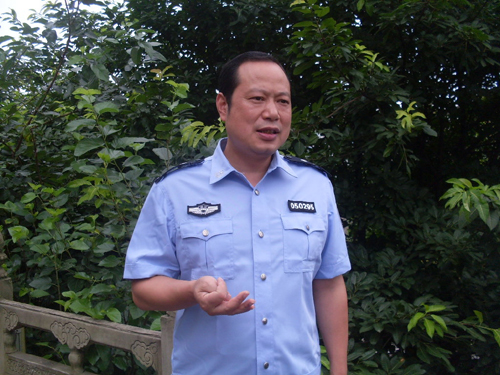Profiles
Flood rescue comes first for top cop
By Huang Zhiling (China Daily)
Updated: 2010-07-28 07:26
 |
Large Medium Small |
GUANG'AN, Sichuan - On July 19, Guang'an, Sichuan's easternmost city, experienced its worst flooding since 1847. It inundated almost every building in the city's old district. Timely excavation and rescue efforts posed a great challenge for local policemen - especially Hu Weiyi.
 Hu Weiyi:"I'm first a policeman, then a husband, a son and a brother." [China Daily]? |
Excessive rain in the upper reaches of the Qujiang River, the Guang'an section, swelled on July 18. Hu, the 43-year-old chief of the city's Yuelai police station, led 10 policemen to the juncture of the old and new districts to keep order.
Just before leaving the station, Hu received a call from his eldest brother who suffered from emphysema and was in intensive care in an area hospital.
Hu's family wanted him to take leave to meet his brother for what might have been the last time. However, considering his duty, Hu wiped away his tears and promised to visit his brother as soon as his work was over.
Arriving at the crossroads, Hu saw floodwater had entered most shops where many goods remained. He divided the 10 policemen into two groups, establishing a cordon where the water level was rising quickly while the others were sent to persuade shop owners to leave.
Hu worked until midnight, standing in waist-deep water. After three hours of sleep in the early morning, he returned to the site at 6 am, July 19, when the water level in the Qujiang River had risen to its peak of 25.8 meters, 9 meters above the alert line.
"At its climax, 28,000 cubic meters of water flowed across the city per second the previous day," said Hu, who has been a policeman for 23 years. "I had never seen so severe a flood; I did not know whether the city could withstand it."
As the water level continued rising, more shop owners tried to bypass the cordon to evacuate their goods, and an equally increasing number of onlookers turned up.
"It would have been quite dangerous if the cordon broke down," Hu said.
Things only got worse. Hu received a call from his wife that his 63-year-old mother-in-law had suffered an unexpected cerebral hemorrhage and was being rushed to the Guang'an People's Hospital.
As his wife herself was trapped elsewhere, she asked Hu if he could accompany her mother to the hospital.
But "sorry" was all Hu could say.
"Thankfully some kind-hearted neighbors had assisted my father-in-law in sending her to the hospital in time," Hu said.
The following day, Hu worked another 21 straight hours with little time to eat. He was exhausted by the end but enjoyed a sigh of relief after water began receding before returning to the normal levels later that day.
Hu was not alone. From July 18 to July 20, some 6,000 policemen worked for more than 40 hours for the flood excavation and rescue effort, enduring the scorching sun during the day and mosquito bites at night.
All told, they evacuated some 61,000 stranded people, saved perhaps more than 840 lives, transferred 19,411 tons of materials and patrolled on the streets, according to the local police authorities.
Throughout they worked mostly in waist-deep water, making the ability to rest next to impossible. This was quite a physical challenge for Hu, the oldest officer in the station.
But Hu didn't complain, and was glad to know that not a single fight or robbery was reported during the flood.
But Hu said he had a crushing sense of guilt for not being able to care for his ailing family members.
To his relief, Hu's mother-in-law survived the ordeal - but, sadly, his eldest brother remained in a coma.
"I rushed to see him soon after the flood receded," he said. "He might not be able to hear my explanation, but I know he will understand me."
"I'm first a policeman, then a husband, a son and a brother," the 43-year-old police station chief said.



